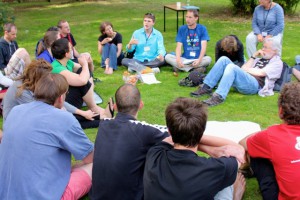For our second guest post in this discussion about economics, here’s my dear buddy Bjarne Braunschweig. He cites Klaus Werner-Lobo and Jesus of Nazareth as the main influences on his economic thinking, and everyone who knows him knows he cares a lot about Fair Trade. As always, comments below are open for your questions and comments.
Michael stated that systemic problems within existing systems ought to be recognized, and then we should try to figure out how these can be overcome. Mattan wrote something quite similar: “We should see how permissive we can get, how much we can let people run their own life – and then see where and if it fails and how can we fix it in the least disruptive way.” They described the “system” in different words: Mattan called it freedom for oneself, and Michael simply called it the system of the society we – at least in Germany – live in right now.
My problem is: We already have seen our system fail again and again and again.
If you’re looking at 2008 and the devastating “minus” on the stock-markets or if you look at how Greece is crumbling into little pieces of foreign policy-intruders, you can see it, feel it, sense it.
And what are we doing? Nothing but to curl up in our own little nests of comfort – built of money – which we want to keep as comfortable as possible, by any means necessary. We fail to look at the system itself or the big picture. When I am talking about “this system” or “our system” I am talking about the free market, which is run by enormous companies and governments cooperating with each other. This may not be true for all the markets and economics of every country, but we have infiltrated even the smallest and poorest countries with our “Diet Coke and Snickers” ideology and we are thereby undermining the free and less stable markets in a lot of African and South American states.
Our system is failing. Right now.
Freedom for us and the free market? How about freedom for everybody.
The situation in Germany is grand! We have public schools, for which we do not have to pay. We have a lot of universities at which we can study for free. We have a welfare system, which is failing in some cases to provide personal freedom and dignity, but provides money in exchange for sending a few letters of application per month. There is a serious problem, though. A so called “new lower class” is rising in Germany. What they lack most is not money, but education and perspective. But that is a topic, as Michael also said, that should be addressed in a different post. And seriously, we talk and cry, while we are standing above most of the worlds population in almost every way possible. Health care, schools, money, we have it.
And as much as I see the need of people in this country who try to get a job which does not leave them empty inside, perhaps even heartbroken, I also see people suffering on a much greater scale in so many parts of the world, such as east Africa or China.
We have freedom of speech. We have freedom of religion. We have the right to speak up against injustice.
An estimated 70 to 75% of the world’s population does not.
As Michael stated, we as the wealthy people – living among, beside or away from the poor – have certain responsibilities. We have power, in one of the few currencies power can come in: money. And with great power comes great responsibility. “We are all capitalists: we all agree that where the market works, it should remain, because we realize that free enterprise is a necessity for our freedom and that the free market, where it works, is the only moral way for people to interact in their skills, abilities, time, needs and wants”, said Mattan so passionately (emphasis mine).
The problem is: morality and economics often do not go together. Stephen J. Levitt, economist and co-author of Freakonomics, says: “Morality, it could be argued, represents the way people would like the world to work – whereas economics represents how it actually does work.”
And that is, from my point of view, the problem which makes me so angry and lets our system fail so often in so many different ways. We fail to bring together decent moral standards we use in everyday life in our own (wealthy, democratic) countries – like equality – when we are exploiting workers in so many other countries. We fail on such an enormous scale to apply decent standards of morality to our economic system: Speculation on food prices, modern colonialism in the form of land-grabbing (where people from all over the world buy huge pieces of land in Africa and South America), and not enough money and no sign of ethically right treatment for the people who make our clothes and raise our food. That is exploitation and a new form of slavery. We made those people dependent on our money but we fail to pay them enough.
Our economics system itself is indeed corrupt and the only reason it still exists is because we do not want to see the evil we are doing. The longer we deny that, the longer we live a lie in our wealthy, comfortable homes.
Why are we responsible for children dying in Africa, while we are living in Germany? There are a lot of reasons, but sticking to economics, it’s because we exploit the farmers and manufacturers there and pay them hardly enough to survive on their own, let alone to support a family. Because we export our left-over food and milk and sell it for only a small fraction of what the food costs if it is produced in Senegal itself, for instance. Because we only look at our own well-being, our own freedom and our own human rights.
We don’t need thoroughly planned economics, because that would not work and is an insult to freedom itself. But maybe we should finally see where the system and the free market itself fails and that people should always matter more than money.
![[Video/TED] Annals of the Robot Internet: Eli Pariser on Facebook and Google](https://www.didyoulearnanything.net/wp-content/uploads/04.jpg)
![[Video/TED] Annals of the Robot Internet: Eli Pariser on Facebook and Google](http://www.didyoulearnanything.net/wordpress/wp-content/uploads/04-300x225.jpg)









